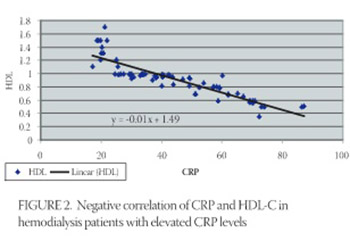Lipoprotein (a) as an Acute Phase Reactant in Patients on Chronic Hemodialysis
DOI:
https://doi.org/10.17305/bjbms.2010.2728Keywords:
CRP, acute phase reactant, Lp(a), HDL-C, serum albuminAbstract
Lipoprotein (a) [Lp(a)], is an independent risk factor for atherosclerotic cardiovascular disease in patients on chronic hemodialysis. A low concentration of high density lipoprotein cholesterol (HDL-C) and serum albumín are another potential risk factors. The purpose of this study was to explore in patients on chronic hemodialysis, whether Lp(a) elevated levels are influenced by activated acute phase response (APR) and the correlation of Lp(a) with HDL-C and serum albumin. In 69 hemodialysis patients with C-reactive protein (CRP) levels over than 10 mg/L and 101 hemodialysis patients with CRP levels in the normal range, Lp(a), HDL-C and serum albumin were determined in relation to CRP, as a sensitive marker of an APR. Results showed that serum concentration of CRP in 69 hemodialysis patients was significantly higher than in controls (44,62 mg/L versus 8,75 mg/L, p<0,01). Patients with elevated CRP had significantly higher serum levels of Lp(a) and lower serum levels of HDL-C and albumin, than patients with CRP in the normal range (35,39 mg/dl versus 28,6 mg/dl, p<0,01, 0,91 mmol/L versus 1,29 mmol/L, p<0,01 and 33,56 g/L versus 35,86 g/L, p<0,01). Lp(a) levels correlated positively with CRP and negatively with HDL-C and serum albumin, in patients with elevated CRP, but not in healthy controls. According to the results Lp(a) reacts as an acute phase protein, in patients with APR.
Citations
Downloads

Published
How to Cite
Accepted 2017-11-28
Published 2010-02-20









